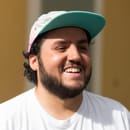With the internet being accessible, it has become easier for independent artists to find an audience and let their work be known. As a result, a variety of movements, collectives, and scenes have found a way to pave their way. The independent art scene in Puerto Rico is no different. Recently, a variety of artists from a multiple disciplines have found platforms that have made it effortless for them to share their work. In addition, small businesses such as Electroshock in Santurce and Rio Piedras, bars like Off The Wall in Mayaguez, and libraries like La Casita Books and Gifts in Aguadilla, have provided up-and-coming artists a space for them to display their talents. “Puerto Rican Women Killing It in the Independent Art Scene” are interviews which provide a glimpse at a few of the women who are making their way in said movement. Though the artists were asked similar questions, some were asked queries focused specifically on their work.
Ana Portnoy Brimmer is a poet, performer, creative nonfiction writer, and ARTivist whose work has been characterized by touching on themes such as identity, Puertorriqueñidad, family, social critique, politics, and others. She has been published in a variety of magazines and journals. The following interview was conducted online.
How did you get into writing, especially poetry?
During an interview in 1979, Audre Lorde talked about how, when she was young, there were certain things she knew and felt in a preverbal way, and that initially, it was only by referring to poems as a reader herself that she could express what she was thinking or feeling, and ultimately, she recurred to writing her own when she couldn’t find poems to reflect the complexities taking place inside her. When I was younger, and oftentimes to this day, I also found/find myself unable to articulate so many of the complexities taking place within and without me, and writing, particularly poetry, became one of the few ways I could conceptualize the pre-verbal spirals in my head.
(Portnoy Brimmer performing)
I’ve seen your work is highly influenced by identity, politics, civil rights, and your passion for the arts, how did this happen?
What we call “la crisis” in Puerto Rico is not a new or recent phenomenon. PR has been in a state of crisis since 1898 (and more than 400 years before that), and as I found myself getting involved in struggles against so many of the injustices and abuses we have had to withstand on a day-to-day basis (on a local and global level), I found that poetry and writing, at least for me, were powerful tools with which to record, rethink, and resist these. For as long as I can remember, I’ve believed that one of the best ways to speak truth to power is through writing, and through the arts as a whole. In terms of identity politics, my parents are Mexican-Jewish immigrants; I was born in NY, but I was raised and currently live in Puerto Rico, so poetry helped me come to terms with my hybrid identity, reconciling all of the dimensions of myself.
How do you balance and/or mix poetry, photography, and academia?
I’ve kind of unintentionally moved away from photography (I’ve been meaning to return to it), but in terms of poetry and writing, academia and ARTivism, I try to see them as dimensions that feed each other, that spill over and fill in each other’s gaps, instead of compartmentalizing them as isolated spheres, and that tends to help in terms of balancing out my time and giving each field the care and dedication they deserve.
(Portnoy Brimmer in her role as an ARTivist)
What do you think about the current state of the arts in Puerto Rico?
I think the arts are definitely one of the strongest mechanisms of resistance at our disposal, and that everything from muralism and public art, to music, to public theatre, to poetry, to opinion pieces, to comedy, to graphic novels and comics, are currently doing a great service to/for Puerto Rico, especially given the historic socio-political juncture we find ourselves in. The arts are shedding light and visibilizing Puerto Rico’s colonial reality, the current humanitarian crisis, and the decades-long abuses we’ve had to withstand. And as is the way with neoliberalism, the austerity campaign overseen by the Fiscal Control Board and central government are blatantly attacking the arts and humanities, and it is through these that we can and should come together as a community and collective, instigate critical thought, galvanize resistance, and heal.
What do you think about the current state of the independent scene in Puerto Rico?
Again, I think it’s doing a great service to/for Puerto Rico, creating spaces for often-obliterated voices and perspectives, for innovative and revolutionary ideas.
(Portnoy Brimmer performing)
Is there any other form of art you wish to pursue? If so, what field and why?
I’ve always thought that if I had a chance at another life (or maybe I don’t have to wait that long, I should stop making excuses and just do it), I would like to properly play an instrument (probably something in the percussion family) or pursue comedy. Music, because it is yet another language with which to articulate the preverbal, which so often stays just that, and comedy because of its subtle transformative power and healing nature; I find funny women incredibly admirable and empowering.
If a young girl came up to you and said she wanted to be an artist, what would be your advice for her?
To listen to those who walked before her, to those who walk next to her, and to those who will be walking in times to come. And that there’s nothing more beautiful than being an artist in community.
What do you look to achieve with your work?
I hope to shed light on Puerto Rico’s history-in-the-making, on its immediate reality, and to contribute to the pressing struggles of our time and place(s).
What is your biggest goal right now?
My biggest goal is to be a part of a creative and collective effort towards socio-political change.
Find Ana Portnoy Brimmer on her website
All the pictures in this article were provided by Portnoy Brimmer.


